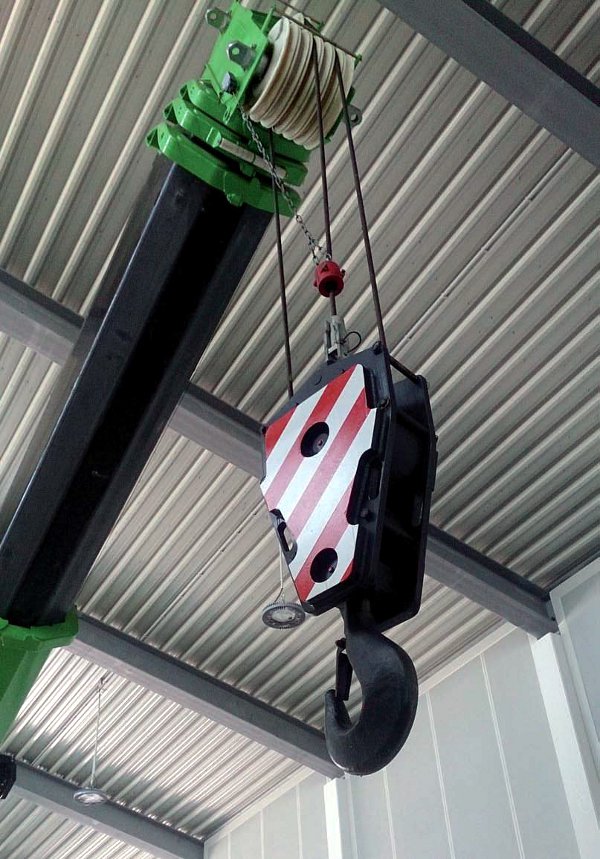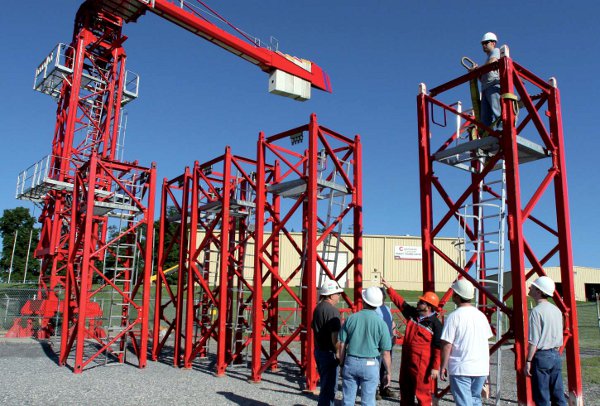Manufacturing the mind
3 September 2014This summer saw the opening of a new training facility from manufacturer Sennebogen in Straubing, Germany. The firm isn’t the first manufacturer to invest heavily in training. As Zak Garner-Purkis found, many crane builders are investing in training for operators and introducing engineers to new machines.
There is no singular set of criteria when it comes to crane training it's a discipline that varies greatly from country to country and between crane types.
The issue can sometimes be a minefield for a rental firms as many different certifications must be managed to assure that their operators can use all the machines they need to. There are many different organisations involved in this process all offering to train crane users and the market for these programmes is a large one. A new player that has gained increasing prominence as a training organisation is the crane manufacturers who are offering more crane related training than ever before.
For many manufacturers the development of training programmes has come alongside an increased emphasis on the service aspects of their crane business. Jere Woolcock, training manager North America, Terex Cranes and Juergen Christmann, group leader service training,
Zweibrücken, Terex Cranes explain: "Manufacturer training is vital to the longevity of service support. Our training centres welcome internal team members, distributor and end user personnel on a weekly base. Besides comprehensive factory training, we can provide customised or factory equivalent courses at the customer's location. We provide both technical and operator courses for all of our crane products."
It's something that Liebherr's Head of Sales Promotion at Liebherr-Werk Ehingen Wolfgang Beringer has also seen: "Our training centers are very important for the training of our own staff as well as for the staff of our customers. When it comes to training of own staff it's about having a know-how transfer.
We have high technological products, we have high demands concerning quality, our employees have to be flexible, we want to develop our expertise further, we have to offer high service quality worldwide and training of own staff effects higher satisfaction of the employees. In terms of training a customer's staff we support our customers and crane operators in all questions around the crane. This could be crane operation, safety issues, efficient operation. This leads to a higher customer satisfaction. When customers use cranes safely and efficiently, they can earn money with our products."
There are different methods for manufacturers to provide these training services. Normally they use the dealer and distributor networks for such programmes, but increasingly many firms are building centres to deal with the management of these training schemes. It's certainly something that US-manufacturer Link Belt has invested in as David Tripp, the firms training manager, explains: "As the crane industry continues to advance technologically, the importance of in depth training increases.
Link-Belt has recognised that the best way to provide high quality training that is equal to the quality of our products is through a training center. Due to the nature of equipment we manufacture, simulators can only go so far.
It is essential that we are able to provide our students with hands-on training. Our training centre allows full-blown complex procedures to be completed in a controlled environment with instructor oversight."
"There are a wide range of training courses offered at the Link-Belt plant in Lexington, KY. Most courses focus on the service side of training, preparing technicians with task specific training. Other courses we offer include basic electrical, mechanical and hydraulic training as well as specific crane model operation and maintenance training."
Expanding these services to manufacturers' customers around the world can be can be handled in various ways. Terex, for example use a ladder-based learning system with remote modules to supplement its hands on training as Woolcoka and Christmann explain: "We combine theory and practical learning using simulators and or machines to help students understand complete systems found on today's cranes. We also offer a comprehensive range of on-line technical courses, which are the prerequisite before factory courses. The customised operator courses are mostly completed at the customer's facility."
Manitowoc leverages its wide network of partners to spread training expertise, as a spokesperson from the company says: "At Manitowoc, the majority of our training efforts are focused on technical training; we teach our global salesforce and dealers how to use, sell and maintain our products in great detail. This knowledge is then transferred to our customers the world over, so it's crucial we get it right. "To do so, we have invested in the people and facilities to conduct comprehensive training at a very high level. We operate 10 state-of-the-art training facilities located around the world that provide customers and dealers with the perfect environment to learn every aspect of optimum crane usage and care."
Across the industry
The crane business is all about long and well established relationships. So it is no surprise that manufacturers work with other parties in the industry to develop the training programmes.
Link Belt are one company who use the industry to set the benchmark for their schemes as David Tripp explains: "Link- Belt has a high level of focus on our customer's needs and their voice greatly influences the development of training programs. We also place great importance on needs assessment and task analysis of our training students to help us ensure our training is relevant to "real world" scenarios.
"Link-Belt offers a Preferred Technician Training Program (PTTP) for crane owners and a Master Technician Training Program (MTTP) for Link-Belt distributors. Both of these programmes help prepare technicians to provide the necessary lube and maintenance for our cranes. Additionally, the programmes cover diagnostics, troubleshooting and calibrations to ensure the technicians can keep the equipment up and running on the job site."
Terex also uses the industry feedback to hone its offering say Woolcoka and Christmann: "Our main goal is to train all appropriate persons that will help to reduce downtime on our products. We are in regular contact with our customers to get feedback for our courses. That way we can constantly improve the training and adapt it to customer needs."
New bricks and mortar
Sennebogen and Manitowoc are amongst the manufacturers who have recently invested in major new facilities to boost the training side of the business.
The €6m Sennebogen Academy, built next to the firms existing facilities in Straubing, Germany features all the latest training tools as well as a museum and conference facilities. The company said that because it is a private business they were able to make an investment with no immediate financial reward quicker than public businesses where the decision would have to been run by shareholders, giving them an advantage
Manitowoc's investors however didn't appear put off when approving the firm's new training centre, built at its Crane Care facility in St Pierre de Chandieu, France, proving that the benefit of training is seen across manufacturers. The centre will offer 55 different hands-on training modules, lasting anywhere between two days and seven weeks. The company expects to train more than 1,500 crane technicians per year there.
Ghislaine Journay, manager of the training center believes that the facility is well equipped to play an important role for the manufacturer: "Our comprehensive training programmes cover every area of crane use, and this new facility will allow us to deliver those courses in the best way possible. Using the latest equipment and cutting edge technology, together with our in-house experts, we can deliver the optimum support service to our customers."
One for all or all for one
The manufacturers' involvement in the training process can be viewed from a different slightly more cynical perspective too. Having one firms crane specialists particularly well trained on your brand of machines makes a firm more likely to invest in that specialism. In this sense the investment in training from manufacturers isn't an entirely selfless act. David Tripp of Link Belt certainly sees the benefits:
"The more a customer understands the operation and maintenance procedures of a crane, the more familiar they will become with the product, and appreciate the quality of Link-Belt Cranes and remain brand loyal. The better trained the technicians and operators are on how to correctly operate a crane, the less down time there will be for a machine. Less downtime equals more productivity, which means more money for the customer. These factors may well influence a customer into buying more Link-Belt equipment."
Sennebogen also believe that its €6m investment in the firms new facility in Straubing Germany will benefit the company commercially too, says Michael Ibarth, managing director of the Sennebogen Academy: "We believe this focus on training we help create an even better service section to our business. Spreading the breadth of our technical training definitely gives us a competitive advantage. By giving our customers the necessary skills to service their cranes they also get an edge on their competitors."
This is not to say that manufacturer training schemes only provide brand specific skills. Much of what is taught to students on such courses can be applied to cranes regardless of the name emblazoned on the vehicle. Although such programmes are definitely connected to the manufacturers service offering they do remain distinct from other parts of the business. Sennebogen made the decision to run its training services as a distinct business, Ibarth explains: "Our company comes within the Sennebogen group but is separate from the production side of the business. The structure is designed with transparency in mind particularly in terms of costs and activities.
The target in the first year having built the new centre is to really get things moving. We want to enhance the training and communication with our dealers and distributors this is hard to express in figures but we want to increase the number of training days."
Training is so important to the lifting industry that the growing involvement of manufacturers can only have a positive effect. As long as qualifications don't become brand specific, goals aren't short sighted or financially driven the signs are very good. The process is one that needs constant attention because technology keeps moving and crane specialists need to understand it, not only to make sure that a jobsite is efficient but also so it is safe.



